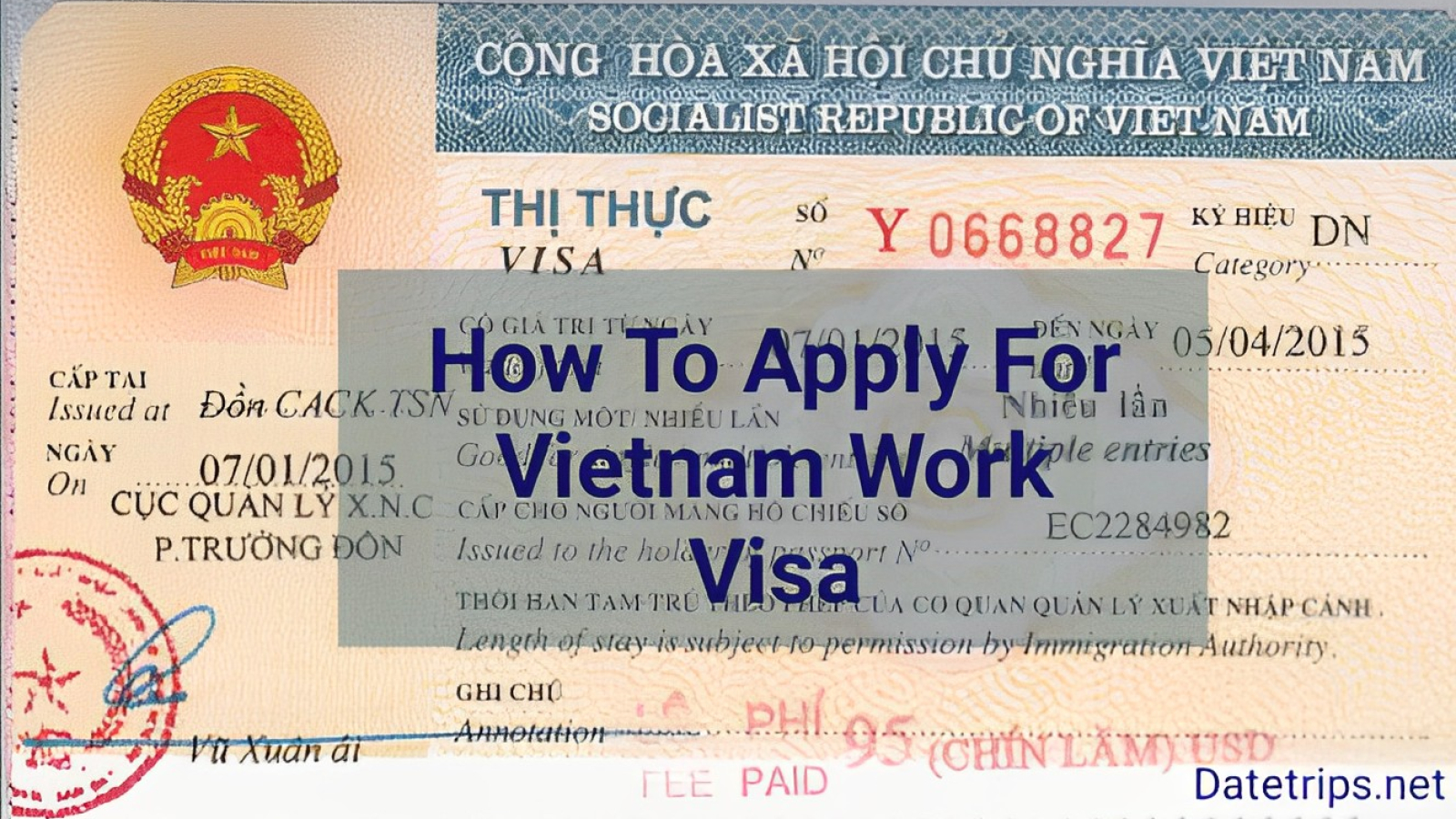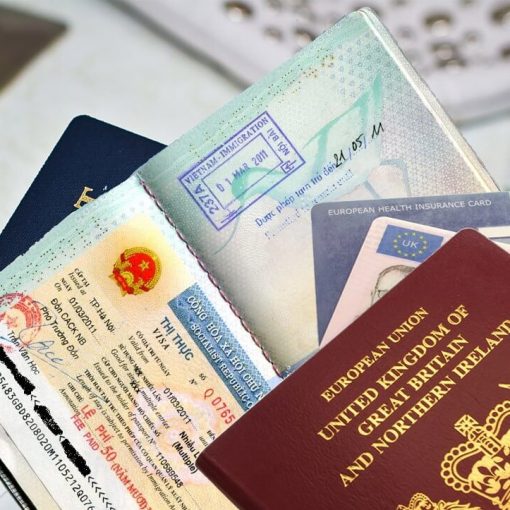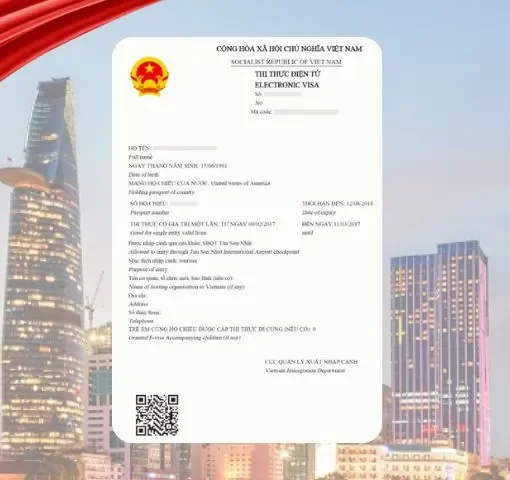Vietnam has become an increasingly popular destination for individuals seeking employment opportunities. However, before embarking on a new job in Vietnam, it is crucial to understand the country’s work visa requirements, application process, and other important details. This article aims to provide a comprehensive guide to obtaining a Vietnam work visa, covering everything from the necessary documents to visa extensions and regulations.
Vietnam Work Visa Requirements
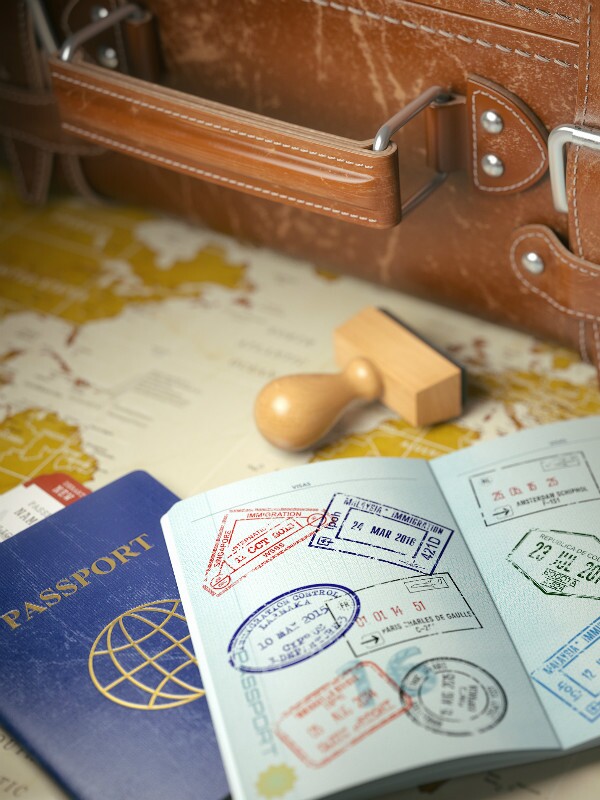
To work legally in Vietnam, foreign nationals must meet specific requirements set by the Vietnamese government. The following are the key prerequisites for obtaining a work visa in Vietnam:
- Job Offer: A valid job offer from a registered company or organization in Vietnam is a fundamental requirement. The offer should clearly outline the position, duration of employment, and salary details.
- Qualifications and Experience: Depending on the nature of the job, the applicant must possess the necessary qualifications, skills, and experience relevant to the position. Academic degrees, professional certificates, and work experience may be required.
- Health Clearance: Applicants must undergo a medical examination to ensure they are physically and mentally fit for work. This typically involves a general health check-up and screening for contagious diseases.
- Criminal Background Check: A clean criminal record is essential when applying for a Vietnam work visa. Applicants must provide a police clearance certificate from their home country or any previous countries of residence.
- Sponsorship: In most cases, the employing company or organization acts as the sponsor for the work visa application. They will facilitate the process and provide necessary documentation.
Summary: To obtain a Vietnam work visa, applicants need a job offer, relevant qualifications and experience, a clean bill of health, a clear criminal background, and sponsorship from their employer.
How to Apply for a Vietnam Work Visa
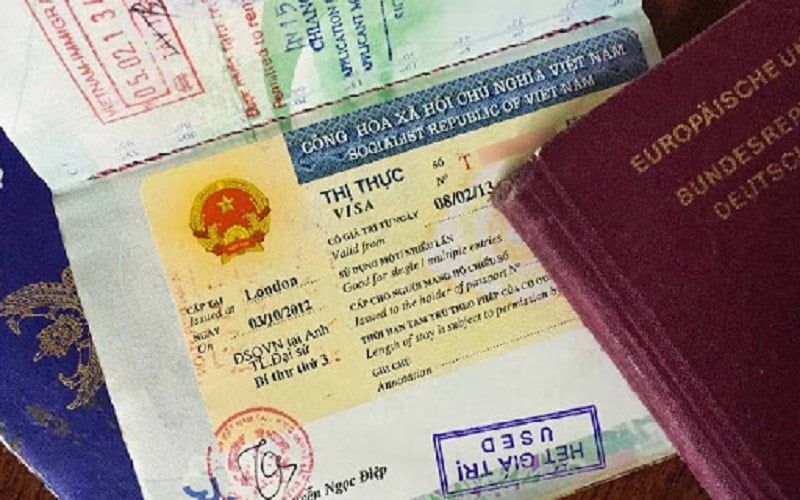
The process of applying for a Vietnam work visa generally involves several steps. Although the exact procedure may vary depending on the applicant’s nationality and the specific circumstances, the following outline provides a general overview:
- Job Confirmation: Before applying for the work visa, the applicant must secure a job offer from a registered company or organization in Vietnam. The employer will provide a letter of confirmation stating the employment details.
- Prepare Required Documents: Gather all the necessary documents required for the visa application. These typically include:
- Passport with at least six months of validity remaining
- Completed visa application form
- Two passport-sized photos
- Job offer letter and contract
- Relevant educational certificates and transcripts
- Police clearance certificate
- Medical examination report
- Submit Application: Submit the completed application form and supporting documents to the nearest Vietnamese embassy or consulate in your home country. It is advisable to contact the embassy beforehand to confirm the requirements and any additional documentation needed.
- Visa Approval Letter: After reviewing the application, the Vietnamese authorities will issue an approval letter if the application is successful. This letter will be sent to the applicant or their employer, depending on the specific process followed.
- Pick up Visa Sticker: Once the approval letter is received, the applicant can collect the visa sticker from the Vietnamese embassy or consulate. This sticker will be affixed to the passport, allowing entry into Vietnam.
Summary: To apply for a Vietnam work visa, applicants need to secure a job offer, gather the required documents, submit the application to the Vietnamese embassy, obtain an approval letter, and collect the visa sticker.
Types of Work Visas in Vietnam
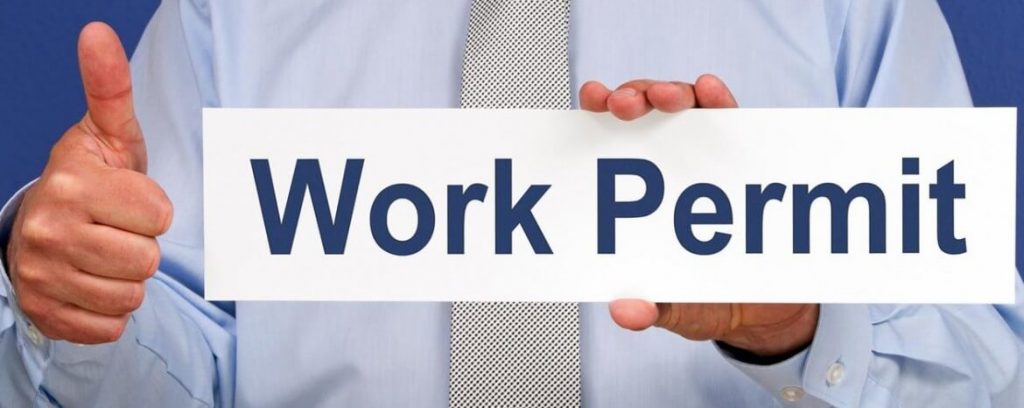
Vietnam offers different types of work visas to cater to various employment categories. The type of visa required depends on the nature of the work and the duration of stay. The following are the main work visa categories in Vietnam:
- DT1 Visa (LD Visa): This visa is issued for foreign employees assigned to work in Vietnam for a period of more than three months. It is suitable for professionals, managers, and executive-level employees.
- DT2 Visa (DN Visa): The DT2 visa is for individuals who are co-owners or shareholders of Vietnamese companies. It allows them to work under the company’s registration.
- DT3 Visa (NN Visa): This visa is designed for representatives from foreign businesses who need to work in Vietnam for an extended period.
- DT4 Visa (LĐ Visa): The DT4 visa is for foreign workers working on contracts or agreements in Vietnam with a duration of fewer than three months.
- DT5 Visa (DL Visa): This visa is specifically for foreign lawyers practicing in Vietnam.
- DT6 Visa (DH Visa): Individuals who come to Vietnam for internships are eligible for the DT6 visa.
Summary: Vietnam offers various work visa categories, including DT1, DT2, DT3, DT4, DT5, and DT6 visas, depending on the nature of employment and duration of stay.## Vietnam Work Visa Application Process
The application process for a Vietnam work visa involves several steps and requires careful attention to detail. The following sub-outline provides a detailed breakdown of the application process:
- Step 1: Job Offer and Preparation
- Secure a job offer from a registered company or organization in Vietnam.
- Ensure that the job offer clearly states the position, duration of employment, salary details, and other relevant information.
- Gather all the necessary documents required for the visa application.
- Step 2: Document Authentication
- Authenticate and notarize all relevant documents, such as educational certificates and transcripts, at your home country’s embassy or consulate in Vietnam.
- Have the documents translated into Vietnamese if necessary.
- Step 3: Medical Examination
- Undergo a medical examination to obtain a health certificate.
- Find an authorized medical institution in your home country or consult with the Vietnamese embassy/consulate to get a list of approved clinics.
- Step 4: Criminal Background Check
- Obtain a police clearance certificate from your home country or any previous countries of residence.
- Follow the specific procedures outlined by the relevant authorities in your home country for obtaining the certificate.
- Step 5: Visa Application Submission
- Complete the visa application form accurately and legibly.
- Attach the required supporting documents, including the job offer letter, authenticated educational certificates, health certificate, police clearance certificate, and passport-sized photos.
- Submit the application and documents to the nearest Vietnamese embassy or consulate.
- Step 6: Processing and Approval
- Wait for the Vietnamese authorities to review and process your application.
- The processing time can vary, so it is advisable to check with the embassy or consulate for an estimated timeline.
- Once the application is approved, you will receive an approval letter.
- Step 7: Visa Sticker Collection
- Collect the visa sticker from the Vietnamese embassy or consulate.
- Check the visa sticker for accuracy and ensure that all information is correct.
- Affix the visa sticker onto a blank page of your passport.
Summary: The application process for a Vietnam work visa involves obtaining a job offer, preparing the required documents, authenticating them, undergoing a medical examination, obtaining a police clearance certificate, submitting the application, waiting for processing and approval, and collecting the visa sticker.
Documents Needed for a Vietnam Work Visa
When applying for a Vietnam work visa, it is crucial to gather all the necessary documents to ensure a smooth application process. The following is a comprehensive list of documents typically required:
- Passport:
- Valid passport with at least six months of validity remaining.
- Blank pages in the passport for affixing the visa sticker.
- Visa Application Form:
- Completed visa application form.
- The form can be obtained from the Vietnamese embassy or consulate or downloaded from their official website.
- Fill out the form accurately and provide all the required information.
- Photos:
- Two recent passport-sized photos.
- The photos should have a white background, be in color, and show a clear image of your face.
- Job Offer Letter:
- A letter from the employing company or organization in Vietnam confirming the job offer.
- The letter should include details such as position, duration of employment, salary, and other relevant information.
- Educational Certificates and Transcripts:
- Copies of relevant educational certificates and transcripts.
- If the documents are not in Vietnamese, have them translated and authenticated by the respective embassy or consulate.
- Health Certificate:
- A health certificate obtained through a medical examination.
- The certificate should confirm that you are physically and mentally fit for work.
- The examination usually includes general health checks and screening for contagious diseases.
- Police Clearance Certificate:
- A police clearance certificate from your home country or any previous countries of residence.
- The certificate should verify that you have a clean criminal record.
Summary: The required documents for a Vietnam work visa application include a valid passport, completed visa application form, passport-sized photos, job offer letter, educational certificates and transcripts, health certificate, and police clearance certificate.
Vietnam Work Visa Fees
When applying for a Vietnam work visa, there are fees involved that vary depending on factors such as the type of visa and the duration of stay. The following is an overview of the common fees associated with obtaining a Vietnam work visa:
- Visa Application Fee:
- There is an application fee payable when submitting your visa application.
- The fee amount depends on the embassy or consulate where you submit the application.
- Visa Approval Letter Fee:
- In some cases, an approval letter fee may be charged.
- Thisfee covers the processing and issuance of the approval letter by the Vietnamese authorities.
- Visa Sticker Fee:
- Once your application is approved, you will need to pay a fee for the visa sticker that will be affixed to your passport.
- The fee amount varies depending on the type of visa and duration of stay.
- Other Possible Fees:
- Additional fees may apply for services such as document translation, document authentication, medical examinations, and police clearance certificates.
- These fees are not specific to the visa application process but may be necessary to fulfill the requirements.
Summary: The Vietnam work visa fees include the visa application fee, visa approval letter fee (if applicable), visa sticker fee, and other potential fees for related services.
Work Visa Extensions in Vietnam
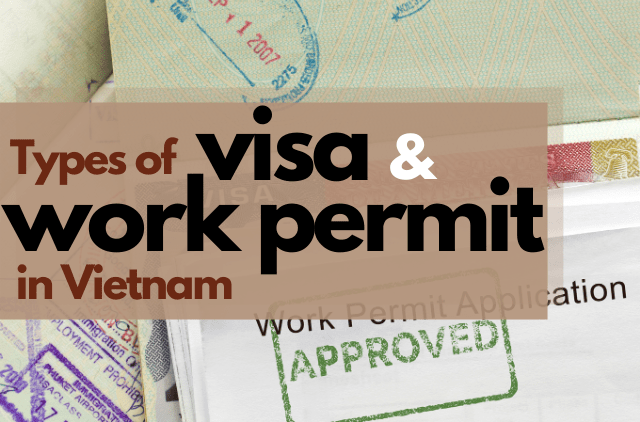
In some cases, individuals may require an extension of their Vietnam work visa to continue working beyond the initial authorized period. The following outlines the process and requirements for work visa extensions:
- Eligibility for Extension:
- To be eligible for a work visa extension, you must have a valid reason, such as ongoing employment or contractual obligations in Vietnam.
- It is advisable to initiate the extension process well before the current visa expires to ensure sufficient time for processing.
- Application Submission:
- Submit an application for a visa extension to the local immigration office where you currently reside or the provincial immigration department.
- Prepare the necessary documents, which may include an application form, a letter explaining the reason for the extension, a new job offer letter (if applicable), and any updated supporting documents.
- Processing and Approval:
- The immigration office will review your application and supporting documents.
- If approved, you will be issued a new visa extension stamp or sticker, which should be affixed to your passport.
- Validity and Duration:
- The validity and duration of the visa extension depend on various factors, including the type of work visa, the nature of employment, and the discretion of the immigration authorities.
- Typically, visa extensions are granted for a specific period, such as three months or one year.
- Renewal and Exit Requirements:
- Before the extended visa expires, you may need to renew it by going through the extension process again.
- If you decide to leave Vietnam permanently before the extended visa expires, you must cancel the visa and complete the necessary exit procedures.
Summary: Work visa extensions in Vietnam require meeting eligibility criteria, submitting an application to the local immigration office, obtaining approval, and receiving a new visa extension stamp or sticker. The validity and duration of the extension depend on various factors, and renewal and exit requirements should be fulfilled as necessary.
Vietnam Work Visa Duration and Validity
The duration and validity of a Vietnam work visa vary depending on several factors, including the type of visa, employment terms, and immigration regulations. The following provides an overview of the typical duration and validity periods:
- DT1 Visa (LD Visa):
- The DT1 visa is generally valid for up to two years.
- It allows foreign employees to work in Vietnam for an extended period.
- DT2 Visa (DN Visa):
- The DT2 visa is issued based on the duration of the company’s business registration in Vietnam.
- It typically aligns with the company’s registration validity, which can range from one to five years.
- DT3 Visa (NN Visa):
- The DT3 visa is usually granted for one year initially.
- It can be extended based on the needs of the foreign representative and the business entity in Vietnam.
- DT4 Visa (LĐ Visa):
- The DT4 visa is designed for short-term work contracts or agreements.
- Its duration typically matches the length of the contract, which is usually fewer than three months.
- DT5 Visa (DL Visa):
- The DT5 visa for foreign lawyers practicing in Vietnam may have a validity period based on specific legal cases or assignments.
- DT6 Visa (DH Visa):
- The DT6 visa for internships is granted for the duration of the internship program or as specified by the training institution.
Summary: The duration and validity of a Vietnam work visa vary depending on the type of visa, ranging from one to two years for long-term work visas (DT1, DT2, DT3) and matching the contract duration for short-term work visas (DT4). Other visa categories have varying validity periods based on their specific purpose.## Work Visa Regulations and Compliance
When working in Vietnam under a work visa, it is important to comply with the country’s regulations and adhere to the terms of your visa. Here are some key points to keep in mind:
- Employment Restrictions: You are only allowed to work for the employer specified in your visa application and job offer letter. Changing employers or positions requires obtaining a new work visa.
- Notification Requirements: Inform the local immigration office or provincial immigration department within 30 days of any changes in your personal information, such as residential address, contact details, or marital status.
- Work Permit Requirement: In addition to the work visa, some categories of employment may require obtaining a work permit separately. Check with your employer and relevant authorities to determine if a work permit is necessary for your role.
- Visa Expiration Monitoring: Keep track of your visa’s expiration date to avoid overstaying. If you continue working after your visa has expired, you may face penalties, fines, or deportation.
- Visa Renewal/Extension: Plan ahead to ensure visa renewal or extension before the current visa expires. Initiate the process well in advance to allow sufficient time for processing.
- Exit Procedures: If you decide to leave Vietnam permanently before your visa expires, cancel your visa and complete the necessary exit procedures at the immigration office.
- Insurance Coverage: It is recommended to have comprehensive health insurance coverage during your stay in Vietnam, including coverage for accidents and emergencies.
- Local Laws and Regulations: Familiarize yourself with Vietnamese labor laws, tax regulations, and other applicable regulations to ensure compliance with the legal framework.
Summary: Comply with employment restrictions, notify authorities of any changes, be aware of work permit requirements, monitor visa expiration dates, plan for renewal/extension, complete exit procedures if leaving early, obtain appropriate insurance coverage, and be familiar with local laws and regulations.
Please note that visa requirements, processes, and regulations can change over time. It is essential to consult official sources, such as the Vietnamese embassy or consulate, for the most up-to-date information and guidance regarding work visas in Vietnam.

